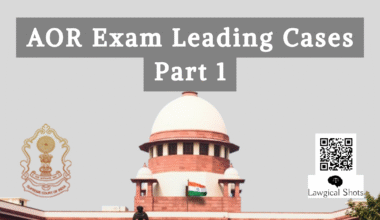If a couple lives like a husband and wife in a society, they shall be deemed as married for legal purposes, that’s what Courts have held when parties failed to prove their marriage. However, can married couples staying separately over a period of time be deemed to have divorced? This was a genuine question coming from someone who had been living separately from his wife for almost 7 years. It was “heard” that there is this concept of automatic divorce in India which makes you legally divorced after a certain period of separation. While the misunderstanding was clarified for him, the question deserves a wider address. Hence, let’s dive deeper into the myth of automatic divorces and their depth.
Decoding Automatic Divorce in India
To begin with, it may be understood that nobody can grant married couples with divorce in an automatic manner. There is no concept of automatic divorce in India. Someone asked “Can I get divorce without going to court in India?”. This guy assumed that staying away for a few years meant someone from the government would come to their house to award a divorce decree. No Buddy!! You either get mutual divorce – where both the parties agree to end the marriage. If not mutual, then there is contested divorce where parties have to prove one of the grounds for divorce as per the applicable laws. Only Courts of suitable jurisdiction have the power to grant divorce. Without going to Court, there is no way to end a marriage, unless it is a Muslim marriage, where things do take a different turn and divorce is acceptable even within the four walls of the house. Hence, Automatic Divorce in India – IT DOES NOT EXIST.
One-Sided Divorce in India
While automatic divorce is a misconception, a myth in India, there is a concept of contested or one-sided divorce. In this case, even if one of the spouses is willing to end the marriage, and the other wants to keep the marriage, the former may approach the Court seeking divorce. Here, Muslim marriages are an exception since the procedure for divorce is quite different since parties can divorce in private without going to Court. For contested divorce, parties need to prove before the Court a specific ground for divorce. The specific family laws governing marriages in India based on religion/secularity provide the grounds for divorce. Since misconception of automatic divorce is somewhat related to the time frame of separation of the husband and wife, there are two grounds of divorce for that as well. While one only requires separation of 2 years, the other one requires absence for 7 years. Let’s have a look at the two grounds of divorce pacing near automatic divorce in India.
Desertion
There is a lot of misconception that 2 years of separation from husband or wife may lead to automatic divorce in India granted by the Government. It may be clarified here that there is no such concept. If due to dispute or misunderstanding, a married couple stays separately, the marriage still subsists until one of them approaches the Court of Law to seek divorce, or both of them go for mutual consent divorce. Let’s have a look at the legal provisions on desertion as a ground for divorce.
Section 13 (1)(ib) of the Hindu Marriage Act, 1955 states about desertion as a ground for divorce. The provision lays that if a husband or wife “has deserted the petitioner for a continuous period of not less than two years immediately preceding the presentation of the petition”, this can be a divorce ground for the other spouse.
Indian Divorce Act Section 10 (1)(ix) also states desertion as a ground of divorce for Christians. It lays that a spouse may file for contested divorce if the husband or wife “has deserted the petitioner for at least two years immediately preceding the presentation of the petition”.
Section 27 (1)(b) of the Special Marriage Act states when a person may apply for contested divorce on the ground of desertion. If a husband or wife “has deserted the petitioner for a continuous period of not less than two years immediately preceding the presentation of the petition”, it may be a ground for divorce. Here again, there is no concept of automatic divorce in case of desertion for 2 years.
Spouse not Heard Alive
Section 13 (1)(vii) of the Hindu Marriage Act lays that divorce may be granted to a spouse on the ground when the husband or wife “has not been heard of as being alive for a period of seven years or more by those persons who would naturally have heard of it, had that party been alive”.
Section 10 of the Indian Divorce Act, 1869 states the grounds for divorce for Christians. Sub-section (1) Clause (vi) of the same lays that divorce may be granted if the husband or wife “has not been heard of as being alive for a period of seven years or more by those persons who would naturally have heard of the respondent if the respondent had been alive”.
Section 21 (1)(h) of the Special Marriage Act, 1954 states when a person may seek divorce when his/her husband or wife “has not been heard of as being alive for a period of seven years or more by those persons who would naturally have heard of the respondent if the respondent had been alive”.
What can be seen so far is that the marriage laws for Hindus, Christians, and the secular marriage laws, all hint at spouse’s absence for 7 years being a ground for divorce. If it is not known whether a husband/wife is alive or dead, no whereabouts for 7 or more years, then the other spouse may file a petition for divorce on this ground. Even here, there is no scope for automatic divorce in India. If the spouse has been unheard of for a few years, then too the other spouse has to prove the same in the Court of law.
Sexless Marriage
A major expectation for people getting married is providing physical intimacy to each other. It is more or less an obligation, out of love or a societal pressure. However, being married and no longer having sexual intercourse is often misconstrued as an automatic divorce requirement. It may be noted that not consummating a marriage may be a ground for contested divorce. However, a few years after marriage, willful denial by the married spouse to have sexual intercourse usually becomes a reason for recurring arguments, or a shallow marriage. The Courts in India have at times accepted sexless marriages as cruelty and granted divorce on that ground. However, again, there is no automatic divorce in India for sexless marriages as well.
Irretrievable Breakdown of Marriage
While the matrimonial laws in India do not lay anything about it, the Supreme Court in 2023 laid “irretrievable breakdown of marriage” as a ground of divorce.
Conclusion – Automatic Divorce a Myth
Based on the detailed scan of matrimonial laws in India, and the divorce provisions, it is clear that automatic divorce is nothing but a misconception. In this case, parties directly approaching the Supreme Court can still get divorce under Article 142 of Constitution of India. When a marriage is beyond repair and there is no scope for reconciliation, living apart for several years with no chance to be together, such a namesake marriage can be dissolved by the Supreme Court. Here again, involvement of the Court is a mandate.
FAQs on Automatic Divorce in India
Q- Is automatic divorce applicable in India?
A- No, there is no concept of automatic divorce in India. Either parties to a marriage may apply for mutual consent divorce, or prove one of the grounds of divorce against the other spouse.
Q- How many years of separation is equal to divorce in India?
A- If a couple is living separately for 2 years, desertion applies as a ground for divorce. If it is unknown whether a spouse is alive or dead, for 7 years, this is another ground for contested divorce. However, there is no concept for automatic divorce in India. Therefore, there is no mathematics for number of years of separation which may equal to getting divorced.
Q- Can husband and wife stay separately without divorce?
A- Yes, a husband and wife can stay separately without divorce. While married couples are supposed to cohabit and stay within each other’s company, living apart does not make an offence. There is a concept of Restitution of conjugal Rights, where a spouse may seek the Court order to bring a spouse back to his/her company. Otherwise, there is no mandate of divorce for married couples staying separately.








